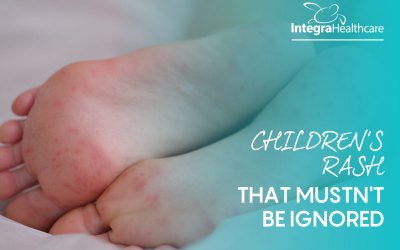This article aims to demystify common food allergies, breaking down the misconception that certain foods and drinks such as cow’s milk, eggs and peanuts should not be given to children at such a young age.
Most common food allergies
Food allergy occurs when a child’s immune system decides that a certain food is a “danger” to their health. The child’s immune system causes IgE antibodies which can react to certain foods and cause the release of histamines and other chemicals – causing an allergic reaction. It impacts roughly 2-5% of children and 10% of babies and unfortunately, the reason for this response in the body is not yet known.
It is important to note that a food allergy is different than an intolerance. A food intolerance means while food can cause a negative reaction for children such as colic or delayed development, it does not impact their immune system. An allergy, as mentioned above, does.
The most common foods that can cause allergic reactions are:
- Cow’s milk
- Eggs
- Peanuts
- Wheat
- Soy
- Tree nuts
- Fish
- Shellfish
Early Exposure to Allergens is Beneficial
For the past several decades, parents have been encouraged to not give children and babies these particular foods. While in some cases, babies do develop allergies and intolerances at a young age such as cow’s milk and may need to avoid these, it is offering the advice as the standard in which researchers argue the possible adverse affect this advice has done.
Professor Carlsen, who evaluated the PreventADALL study, one of the largest studies on food allergy in children concluded from the results that the longer infants are kept away and not exposed to these common food allergens, the more likely they are to have allergies to these foods beyond infancy and into childhood.
It is advised by the NHS that solely breastfeeding or first infant formula should be given to a baby for their first 6 months. At the 6 month mark, they recommend starting to introduce these foods and if there is no allergic reaction or intolerance to keep the foods in the diet to prevent any reaction later down the line. The NHS says that doing these tests of the foods before the baby turns one has proven effective in reducing the allergies they have.
The Norwegian PreventADALL study revealed that the age to start the introduction of these foods could safely be reduced to 4 months as this has shown to reduce allergies even more than starting at 6 months (which is also the recommended age in Norway) and are now rallying for this to be the official recommendation in Norway.
This month (March 2023), a UK study has also found similar findings to this Norweigan study in regards to exposing babies to peanut butter from as early as 4 months. The study revealed exposing them to this food at a young age can cut the cases of peanut allergies by over three quarters.
Therefore early exposure of the food allergies are very important.
How to know when something triggers an allergic reaction
As mentioned previously, while this method of early exposure to these foods has shown to improve the overall chances of children getting food allergies or intolerance, allergic reactions can and still do occur.
Allergic reactions can progress quickly and cause an onset of several symptoms including:
- Asthma
- Itchiness
- Nausea
- Stomach cramps
- Hives
- Swelling of the face and lips, tongue or mouth
- Itchiness of throat
- Shellfish
- Feeling faint
- Diarrhoea
- Severe reactions such as anaphylaxis – if this occurs seek medical attention immediately or call 911
Get in touch
Even if a child has an allergy, there is a chance they may grow out of it. Some allergies will last their whole life such as tree nut allergies but with other food allergies such as eggs or peanuts, children can outgrow these are they get older. However, it is vital to consult with your doctor before trying to add these foods back into your child’s diet.
At Integra we have four highly experienced Paediatricians who offer food allergy and intolerance testing, advice and a host of other paediatric services. For more information and to book your appointment, click here.



